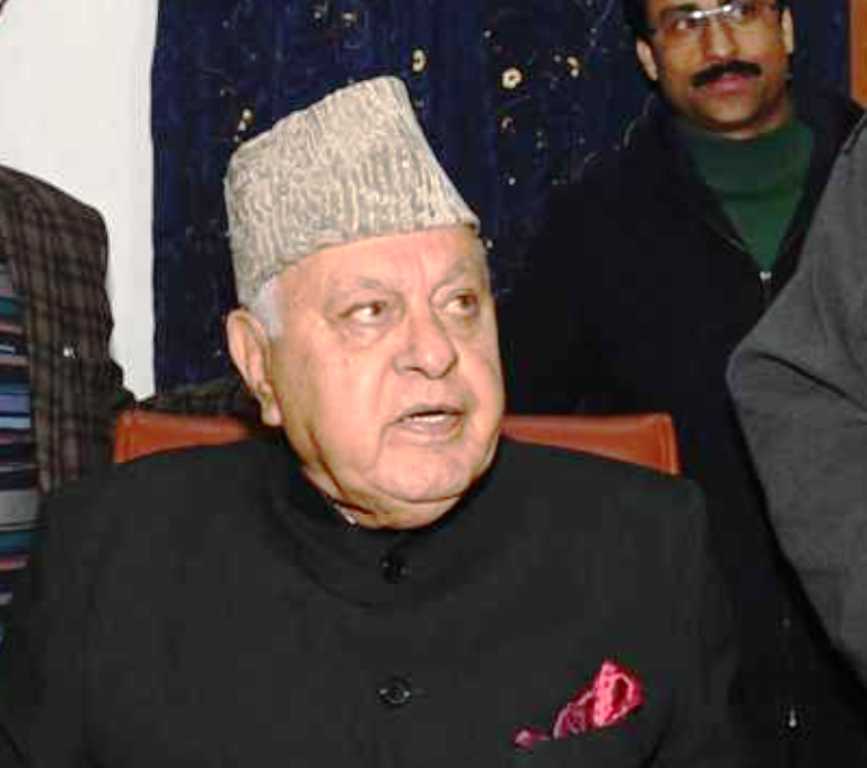by Mufti Islah
KANIDAJAN, (BUDGAM): Every time Farooq Ahmad Wagay walks past hundreds of felled apple and pear trees strewn around a vast stretch of land, he is filled with both rage and grief.

Wagay, his father and grandfather have been growing maize and pulses on a six kanal or .75 acre sloppy land adjacent to his home here for the last five decades.
Twelve years ago, he started to grow a pedigree potato seed and lately apple trees on a portion of land, which Jammu and Kashmir forest department is reclaiming as a forest land encroached by many residents like Wagay.
“For the last six years, we had raised the apple saplings like our own children. But in one government action, they have been chopped mercilessly,” he said.
Wagay said he had brought each apple sapling for Rs 150 six years ago and toiled hard for hours in the makeshift orchard to help them grow. “This year, we were planning to add more trees, but we don’t know if we can,” he said.

Villagers at Kanidajen, 50 km from Srinagar in the central Kashmir district of Budgam, said more than 2,000 trees were mowed down by the forest workers last month.
“The blow of the axe has literally been dealt on our stomach and not the trees,” Wagay said while trying in vain to erect a bare branch that was dangling by the skin of its stump. “This breaks my heart.”
Wagay’s cousin, Ali Mohammad, said the government is poised to dispossess farmers like him of the land they used for generations to earn their livelihood.
Mohammad feared if he is deprived of work on this piece of land it would be difficult for him to pay for the education of his children and look after his family of 14.
“More than 150 trees have been cut in the six kanals I worked on. I would grow potato, maize and apples, but if they snatch this land, my family will struggle hard.”
Villagers said they had heard nearly 50 men from the forest department had arrived with axes and saws last month chop trees on several dozen acres of land used by 30 families.
“We had no inkling they would destroy us. Had we known they would massacre trees we would have requested officials to take the land but spare the trees,” he said.
Govt claims to be implementing Forest Rights Act in J&K but on the other hand people like108 year Zooni are asked to Evict from her village. The land was allotted to them under Grow More Food Programme in 1949. Was 370 abrogated for all this ? @MehboobaMufti @OmarAbdullah pic.twitter.com/BOU8OtU3nE
— rtimuzaffar (@rtimuzaffar) December 4, 2020
Wagay said the forest department had slapped a case against several families of the village asking them to evict the forest land two years ago. The villagers had contested that in the court. “After a few hearings, we were told by our lawyer to resume farming. We did that and no one from the government objected,” he added.
Muzaffar Bhat, a noted Right to Information activist from the Valley, questioned the forest department’s action that he said was “unwarranted”.
“Is the forest department for afforestation or axing trees? The officials could have seized the encroached land and put a caveat that trespassing would invite legal action but it seemed they were keener on destruction,” he said.
Bhat said tribals like Gujjars and Bakerwals and traditional forest dwellers who have lived in the forests for 75 years are entitled to certain rights under the Forest Rights Act, 2006. “To begin with, they cannot be evicted from the forests. Under the Grow More Food programme, they can use the land for tillage,” he said.
The Grow More Food programme was introduced in the 1950s by Sheikh Mohammad Abdullah in a bid to empower the tribals and forest residents.
Sarita Chauhan, Commissioner Secretary, J&K Forests, said the action in Budgam was pursuant to a high court order on public interest litigation filed to remove encroachments. “The honourable court had directed various departments, including Forests, to remove encroachments and based on that we had to act,” she told News18.
Chauhan said there was no government order that called for the eviction of tribals or forest dwellers. “The action was directed against land usurpers. Every forest official in a district has a duty to remove the encroachment,” she said. “Let me assure you wherever we hear forest rights have been infringed, we have stopped.”

Bhat said that since Article 370 was taken down last year, all the Central forest laws, including FRA, 2006, have come automatically into force in the newly created Union territory. However, the J&K government is not very keen to implement the FRA before March 2021.
Chouhan cited the pandemic situation for the delay in implementing FRA. “We have started orientation programmes for forest officials about FRA and rights of the tribal and forest dwellers,” she said.

Meanwhile, it is learnt, the government will first try to conclude a census of the forest land and its dwellers till January 15, 2021.
While the process is underway, the forest department is razing temporary Gujjar kiosks to the ground and serving eviction notices to reclaim forest land from the tribals and residents who live by the forests.
Recently, the government razed summer structures of nomads in Pahalgam setting off a lot of panic among the tribal Gujjar and Bakerwal community.
Former chief minister Mehbooba Mufti met the residents and criticised the administration for disempowering the poor tribal community.
Activists said the sudden and forcible evictions are not only illegal under the FRA, but smack of a bias towards one community.
(Mufti Islah is a senior Srinagar based journalist works for News 18. The story appeared on the TV’s news website, first.)















